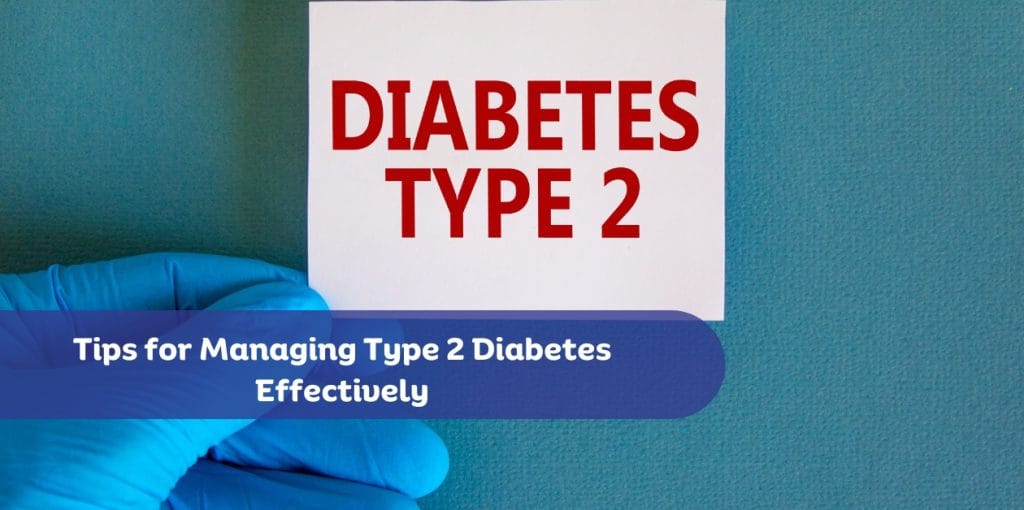Tips for Managing Type 2 Diabetes Effectively

Managing Type 2 diabetes effectively is crucial to maintaining overall health and preventing serious complications such as heart disease, kidney damage, and nerve problems. It involves consistent effort and lifestyle changes, including diet, exercise, and proper medication.
What Is Type 2 Diabetes?
Type 2 diabetes is a chronic condition where the body either becomes resistant to insulin or doesn’t produce enough insulin. Insulin is a hormone that helps regulate blood sugar (glucose) levels. As a result, blood sugar levels can become elevated, leading to various health issues.
Type 2 diabetes is largely influenced by lifestyle factors such as poor diet, physical inactivity, and being overweight, though genetics and family history also play a role. Managing the disease requires a comprehensive approach that includes maintaining a healthy weight, keeping active, and managing stress.
Effective Tips for Managing Type 2 Diabetes
- Prioritize Healthy Eating:
A well-balanced diet is essential for controlling blood sugar levels. Focus on foods with a low glycemic index (GI), which release sugar into the bloodstream slowly. These include whole grains, legumes, fruits, and vegetables. Reducing the intake of processed foods, sugary snacks, and refined carbohydrates is crucial to preventing spikes in blood sugar.
It’s also important to include healthy fats, such as those found in olive oil, avocados, and nuts, and lean proteins to help stabilize blood sugar levels and prevent hunger. Portion control is key—overeating, even healthy foods, can affect your blood sugar.
- Exercise Regularly:
Regular physical activity plays a vital role in diabetes care by helping the body use insulin more effectively. Aim for at least 30 minutes of moderate exercise, such as walking, swimming, or cycling, most days of the week. Exercise helps lower blood sugar levels, reduces insulin resistance, and promotes weight loss.
Strength training exercises (like lifting weights) can also improve insulin sensitivity and help build muscle mass, which increases the body’s ability to manage blood sugar.
3. Monitor Blood Sugar Levels:
One of the most important aspects of managing Type 2 diabetes is regular blood sugar monitoring. By tracking blood sugar levels consistently, you can better understand how your diet, exercise, and medication are affecting your body. Work with your healthcare provider to establish a routine for checking your blood glucose levels.
4. Medications and Insulin Therapy:
While lifestyle changes are key in managing Type 2 diabetes, medications are often necessary to help control blood sugar levels. There are several classes of medications, including oral drugs like metformin, and injectable medications like GLP-1 receptor agonists or insulin.
5. Weight Management:
Maintaining a healthy weight is crucial for managing Type 2 diabetes. Excess weight, particularly around the abdomen, increases insulin resistance. Losing even a small amount of weight can have a significant impact on blood sugar control. Focus on a gradual and sustainable weight loss approach, combining a balanced diet with regular exercise.
6. Stress Management:
Chronic stress can negatively impact blood sugar levels and overall health. High-stress levels trigger the release of hormones like cortisol, which can increase blood sugar. Incorporating relaxation techniques such as deep breathing, meditation, or yoga into your daily routine can help manage stress levels.
7. Stay Consistent with Medical Appointments:
Regular visits to your healthcare provider are essential to manage diabetes care effectively. Your healthcare provider can monitor your blood sugar levels, adjust medications as necessary, and offer advice on managing the disease.
Conclusion
Managing Type 2 diabetes requires a comprehensive approach, involving lifestyle changes, medication, and ongoing monitoring. By staying proactive in your diabetes care and incorporating these effective tips, you can successfully manage your condition and lead a healthier, more fulfilling life.
FAQs
Type 2 diabetes is a chronic condition where the body doesn’t produce enough insulin or becomes resistant to it, causing elevated blood sugar levels. This can lead to complications such as heart disease, kidney damage, and nerve issues.
Effective blood sugar control is possible through a combination of a healthy diet, regular exercise, weight management, and stress reduction. However, many people with Type 2 diabetes also require medication to help manage their blood sugar levels.
Regular exercise helps the body use insulin more effectively, lowers blood sugar levels, and can improve insulin sensitivity. It is an essential part of managing Type 2 diabetes.
Research suggests that people with Type 2 diabetes may have a higher risk of developing certain types of cancer. Managing blood sugar levels effectively and leading a healthy lifestyle can help reduce this risk.
Yes, chronic stress can lead to higher blood sugar levels due to the release of stress hormones like cortisol. Practicing stress management techniques like meditation, yoga, and deep breathing can help keep your blood sugar under control.
About Author
Dr. Y Swetha
MBBS ,MD General Medicine
Dr. Y Swetha is a skilled physician currently practicing at PI Health Cancer Hospital. She holds an MBBS from Kamineni Institute of Medical Sciences and an MD in General Medicine from Prathima Institute of Medical Sciences.Dr. Swetha has extensive experience in outpatient, inpatient, emergency, and critical care settings. She is proficient in managing chronic conditions, critical emergencies, and advanced procedures such as ventilator management and catheter placements.Her academic contributions include presentations on deep vein thrombosis, splenic infarcts, and cardiac tamponade. Dr. Swetha also volunteered as a Telemedicine Doctor during the COVID-19 pandemic, demonstrating her commitment to patient care.With a First Class in MD and fluent in English, Telugu, and Hindi, Dr. Swetha is dedicated to providing compassionate and comprehensive medical care.

